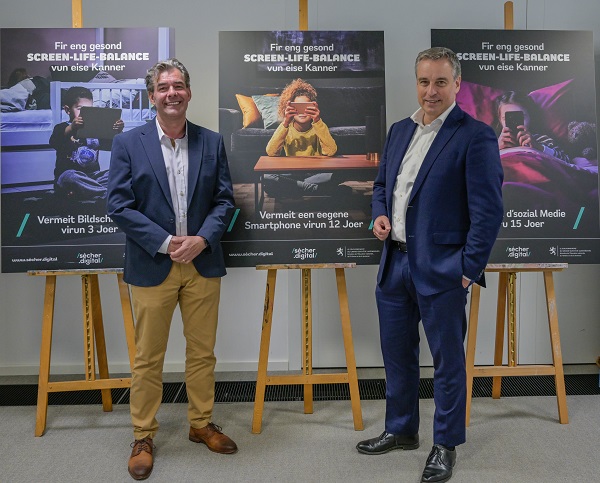 (L-R) Alain Massen, president of the national representation of students' parents; Claude Meisch, Luxembourg's Minister of Education, Children and Youth;
Credit: MENJE
(L-R) Alain Massen, president of the national representation of students' parents; Claude Meisch, Luxembourg's Minister of Education, Children and Youth;
Credit: MENJE
On Monday 30 September 2024, Luxembourg's Ministry of Education, Children and Youth launched a new awareness campaign dedicated to a "healthy screen-life balance" for children.
Luxembourg's Minister of Education, Children and Youth, Claude Meisch, together the president of the national representation of students' parents, Alain Massen, presented the campaign to the press on Monday.
The ministry noted how scientific studies have confirmed the significant influence of smartphones and social media on the physical, social and cognitive development of children. The ministry thus stressed the need for a regulated framework and the conscious use of digital tools.
This is where the new public campaign comes in, according to the ministry. Aimed at parents, it provides recommendations on the use of screens by age category and on the activities that children need for good physical and mental development.
As Minister Meisch explained: "Screen time is a permanent topic in families. At the table. Before going to bed. During leisure time. Today, our children no longer have the opportunity to be bored. The time that we, adults, but also children spend on the smartphone is often wasted time to the detriment of precious moments spent with family or friends."
The campaign has now launched with concrete recommendations for the safe and responsible use of digital tools. This advice is inspired by the work of Dr Serge Tisseron, a French psychiatrist and doctor of psychology, who will be the guest at a conference in Luxembourg on 7 November 2024.
The campaign focuses on the three essential phases of development of children and young people. The ministry recommended that: screens be avoided for children under the age of three; children under the age of twelve do not own a smartphone; children under the age of fifteen avoid social media.
For children under the age of three, the ministry stressed the importance of avoiding exposure to screens during this "essential phase of early childhood development", to leave room for social contacts, direct exchange with parents and for play in order to strengthen their social, emotional and linguistic skills.
The ministry also warned that children under twelve do not always realise the dangers of the Internet. With a smartphone, they have access to content but also to false information. The ministry added that they must first learn to use their own smartphone responsibly with the support of their parents.
For under-15s, the ministry warned that social media can have negative consequences on the development of young people during the sensitive period of puberty. Unethical practices and manipulative algorithms risk leading to excessive use of smartphones and causing emotional stress in young people during this "unstable phase" of their development.
Moreover, the ministry recalled the school measures announced at the start of the academic year. In parallel with the awareness campaign, the ministry will implement measures restricting the use of smartphones at school and in non-formal education structures with the relevant partners.
The ministry added that, at the start of the school year, all parents of pupils attending primary school received a parental letter ("Elterebréif") in several languages from their teacher with recommendations on the subject of "screen-life balance".
As part of the campaign, the Eltereforen, in collaboration with BEE SECURE, will organise several information sessions and conferences. This is where parents can find local contact points who can support them on the subject of screen time, noted the ministry. BEE SECURE will set up the helpline for more information on parental control.
In addition, the ministry said it would intensify its efforts for the offer and promotion of non-digital activities at school, but also during leisure time. Further details to follow.








